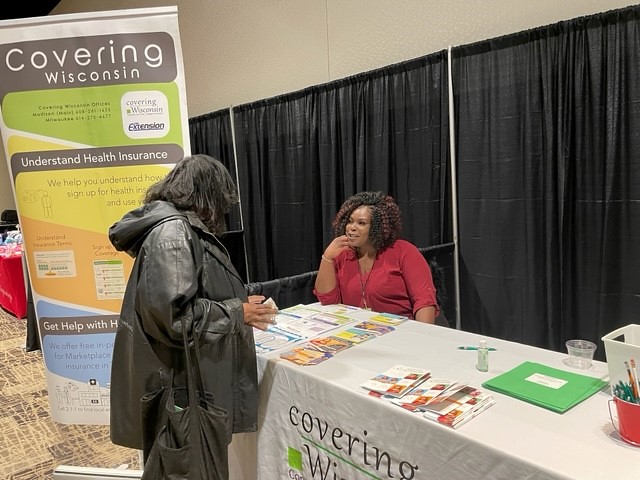Where To Get Advice on Health Care
It's Open Enrollment Period in Wisconsin. Advisors like Quentella Perry can help.

Quentella Perry, a lifelong Milwaukee resident and licensed health insurance navigator at Covering Wisconsin, answers basic questions about coverage and enrollment at a March 19 outreach event. Photo provided by Covering Wisconsin.
When it comes to health insurance, certainty can seem in short supply.
Meet Quentella Perry, whose job with the nonprofit Covering Wisconsin involves helping people plow through the complexities. Just as accountants have their busy season during tax time, people like Perry have got their hands full helping people navigate the choices offered during the Open Enrollment Period from Nov. 1 to Jan. 15.
Outside of this time period, people can enroll in plans only under certain circumstances, including getting a new job, getting married or having a child. If one meets the criteria, state-run Medicaid programs, like Wisconsin’s BadgerCare Plus, can be enrolled in throughout the year.
Regardless of the source of health insurance, though, pretty much everyone is confused about it on some level.
This is where Perry and people like her come in.
Perry will resolve that confusion.
She will answer your questions.
She will walk you through the steps.
You will emerge from your meeting with an insurance plan that meets your needs.
Covering Wisconsin is part of a coalition of organizations and agencies working to increase enrollment among all residents but particularly those who are not insured.
There are 55,000 uninsured people in Milwaukee County, and nearly 35,000 of them live in the city, according to data provided by the Milwaukee Health Care Partnership. The nonprofit partners with health care providers, government agencies and community organizations to serve vulnerable residents.
Other organizations that employ navigators helping Milwaukee residents include Gerald L. Ignace Indian Health Center, Progressive Community Health Centers and Feeding America.
More than a job
Perry, 40, was born and raised in Milwaukee. She has been a navigator for four years but was a certified application counselor, or CAC, for many years before that.
A CAC is a position staffed within a medical setting, such as a hospital, to assist patients when they apply for health insurance. CACs often transition into navigators. Navigators have more experience and can assist CACs when they encounter especially complex or challenging cases.
“This is my passion. I believe education is key. Educating individuals within the community is key. This is something I love doing, and this is why I continue to do this work,” Perry said.
Education must always be the first goal of a navigator, said Cheryl Isabell, Milwaukee community engagement lead at Covering Wisconsin.
“To understand what a premium is … . To explain to them what a copay is. If you’ve never had insurance, or have had to pay for health insurance coverage, you don’t know,” Isabell said.
All the information and documentation can be difficult to keep track of — even for those who are fluent in the process.
“It’s very confusing,” said Winona Grieger, navigator at Gerald L. Ignace Indian Health Center. “Every person that you work with – it’s never the same. Everything is always different.”
After the client understands all these moving parts, “then we discuss different plans,” Isabell said.
Officials urge you to enroll
The Wisconsin Department of Health Services has sent out a “call to action” to organizations like Covering Wisconsin.
The mandate is simple: Enroll, enroll, enroll.
The reason for the call to action, in addition to the number of uninsured people, is because there is additional financial assistance for health coverage that was not available in past years.
If people “have looked before and just chose not to have health insurance coverage because it wasn’t affordable for them, they should look again,” Isabell said.
“If you’re employed, your employer may offer health insurance coverage, but it’s only affordable for the employee – the family plan may be unaffordable,” said Isabell. Up until now, those family members were not eligible for alternative assistance through the marketplace, which meant that the options to insure one’s family members were between a plan that was prohibitively expensive through the employer or a plan without financial assistance through the marketplace.
“Now that the family glitch has been fixed, the family members have the opportunity to get those tax credits (through the marketplace), so now the whole family can be insured,” Isabell said.
Another concern of particular urgency for navigators is the potential end of the federal public health emergency, which has allowed people covered by BadgerCare Plus to keep coverage regardless of changes in their income or household size. BadgerCare Plus recipients have also not been required to update their information, which is required every 12 months under normal circumstances.
When the public health emergency finally does end, recipients will need to update their information and be re-evaluated to determine if they can maintain their coverage.
Although the public health emergency has been extended 11 times since its original declaration in January 2020 and is currently extended until Jan. 11, many health care professionals anticipate its end in the coming year.
“A lot of individuals are used to having help through the state program, and with everyone going back to work and everybody becoming employed, some individuals will potentially be at a loss of their coverage, because of them being over the income limit,” Perry said.
For more information
To make an appointment with a navigator at one of a number of agencies, you can use this online tool hosted by Covering Wisconsin.
Confused about health insurance? For Open Enrollment Period, you need someone like Quentella Perry in your life was originally published by the Milwaukee Neighborhood News Service.



















